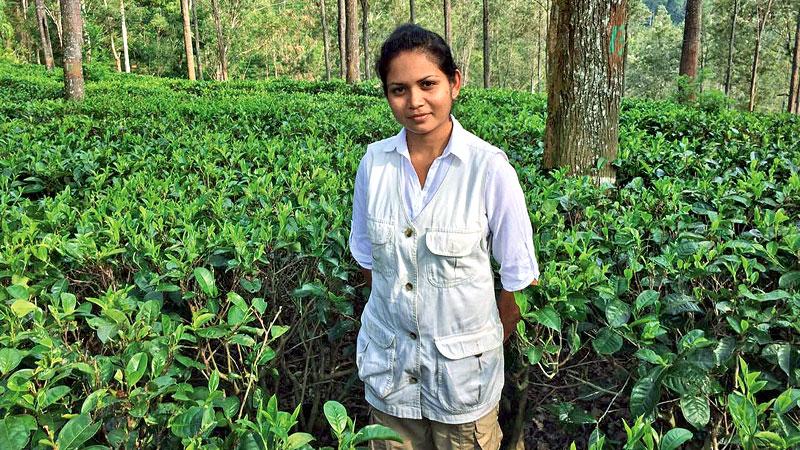
Twenty-six-year-old Chaturika Rajapakse assumed duties as the first Assistant Superintendent of Queens Town Estate in Hali Ella under the Malwatte Valley Plantations on December 1, making history in the male-dominated industry.
A female next in line to be at the helm, turns a new chapter in the plantations which is has always been headed by males as superintendents and assistants.
As in many sectors, women in the plantations are unsung heroes whose hard work goes unnoticed. They account for the bulk of the work force that sustains the industry.
A past student of Vihara Maha Devi Girls’ College, Badulla, Chaturika wanted tread in the path of her father who was a field officer in another estate.
She had all the trappings for the task as a young girl who grew up and worked in the hills. Therefore, her new role would be a duck taking to water.
‘I am extremely happy about the new job entrusted to me and grateful to those who helped me to be where I am today” Rajapaksa said beaming with confidence.
Malwatte Valley Plantations Managing Director Lucas Bogtstra said, “if women can head States and be in higher echelons why can not a woman be the second in command in an estate?”.
“Of the 70 percent of the work force employed as pluckers in an estate, 80 percent are women. Therefore, there is no better person than a woman who could run the show” Bogtstra said.
Chaturika outdid the rest of the creepers who underwent a year’s rigorous training prior to be absorbed to the work force.
“When we interviewed her she stood out from the others. She was confident as she had a plantation background and looked promising” Bogtstra said.
Chathurika is a chip of the old block as her father who is employed in an estate. The Queens Town Estate has a trainee bank of around five to six creepers from whom potential trainees are absorbed to the work force.
Chathurika was selected within a short time, having joined the program in April this year.
“We have given an opportunity for a woman and if it goes well we will take in more to the trade,” Bogtstra said.
However, according to plantation company officials the road to success will not be a smooth sailing for the young lass who will have too many irons in the fire to grapple with in an industry battered by unending issues.
The falling global tea prices, the wage issue and lack the urgent need to go for re planting are some of the burning problems of the perennial industry. An assistant superintendent is tasked with field inspections, supervision of manufacture of tea and labour management.
Malwatte Valley Plantations comprises 5,000 hectares of revenue tea and 2,000 hectares of rubber. The company has diversified into spice plantation.
It is the first company to plant spices on a large scale in Uva in 2008. The company was awarded the ‘Best Pepper Farmer’ at the International Pepper Community Convention in Indonesia in 2015.
“As in the appointment of the first woman assistant superintendent we are focused on innovation and that is how we have diversified our trade,” Bogtstra said.
The company has diversified and moved into new markets as many of its export destinations are affected by conflicts. The plantation industry was privatised in 1992, handing over estates run by State-owned enterprises under the nationalisation in 1972 to 22 private companies .
Tea production has been a main sources of foreign exchange to the country accounting for around two percent of the GDP. The industry contributes nearly US $1.5 billion from exports to the economy and employs directly and indirectly over 1 million people.
The industry was the world’s leading exporter of tea in the mid 1990’s .
However the share of exports dwindled with exports from Kenya taking over to be the leading exporter of tea today. The highest production of 340 million kg was recorded in 2013.
